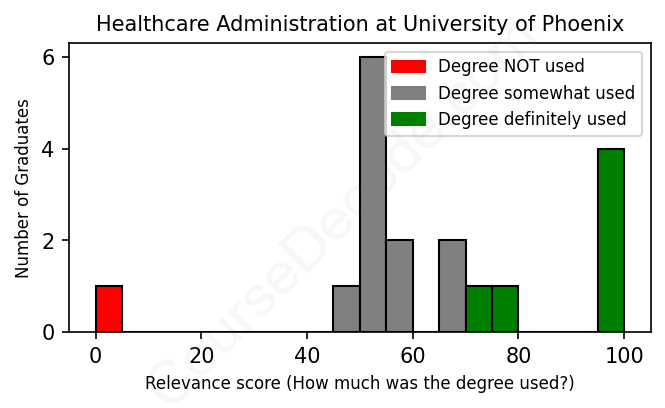
First, some facts. Of the Healthcare Administration graduates from University of Phoenix we've analyzed , here's how many have used (or NOT used) their degree in their career:

These are estimates based on AI analysis of 18 LinkedIn profiles (see below).
The verdict? Slightly below average. Overall, with an average relevance score of 63%, Healthcare Administration graduates from University of Phoenix have a slightly lower likelihood (-4%) of finding work in this field compared to the average graduate across all fields:
And for comparison, here's the chart for all profiles we've looked at across all degrees.
Also, after graduating, only 11% of these graduates have pursued further education other than another Bachelor's degree (such as a Masters degree or other), compared to the average across all profiles of 35%. This suggests a Bachelors degree is enough for most Healthcare Administration graduates, and it's normal to look for work straight after graduation.
See the details:
|
Relevance score: 50% We think this person has gone into a career only somewhat relevant to their degree. We think this person has gone into a career only somewhat relevant to their degree.
DEGREE INFOGraduated in 2013 from University of Phoenix with a Bachelors Degree in Healthcare Administration. No other secondary education since. JOB HISTORY SINCE GRADUATIONHome Health Aide Mid South Senior Care Jul 2016 - Present ABOUTNo information provided. |
The top 10 most common jobs done by the graduates we've analyzed (ranked most common to least) are:
Based on the profiles of individuals who graduated from the University of Phoenix with a degree in Healthcare Administration, it seems that a variety of job positions have been taken up across different sectors. Common roles include positions in billing, administrative support, and healthcare management. Many have worked as Billing Specialists, Claims Customer Service Representatives, or administrative positions such as Executive Administrative Assistants. While some of these roles directly apply knowledge acquired from their Healthcare Administration degree, like the EHR Specialist and Provider Engagement Specialist, many others do not fully utilize the core skills taught in the program.
Overall, it looks like the relevance of their jobs to Healthcare Administration varies quite a bit. Some positions, like Medical Billing Specialists and Cancer Center Financial Counselors, require a solid grasp of healthcare systems and administration, making them highly aligned with their education. However, several roles, especially those in customer service or unrelated sectors, draw on only general administrative skills. This indicates that while some graduates find roles that directly connect to their studies, others end up in positions where their degree's relevance is not as clear-cut, either requiring only a portion of the knowledge or none at all.
Here is a visual representation of the most common words in job titles for Healthcare Administration graduates (this is across all Healthcare Administration graduates we've analyzed, not just those who went to University of Phoenix):

From analyzing these LinkedIn profiles, it seems that graduates from the University of Phoenix with a degree in Healthcare Administration have generally had varied but mostly relevant career trajectories in the healthcare sector. Many of them tend to start in positions like administrative roles, billing, and customer service—these serve as solid entry-level positions that allow for gaining necessary industry experience. For instance, roles such as Billing Secretary, Executive Administrative Assistant, or Customer Service Representative are common first jobs after graduation. The diversity in their first jobs indicates that many students successfully found positions related to healthcare administration right after college, signaling a good employment rate in the field.
As we look further down the line, about 5 to 10 years after graduating, many individuals seem to have moved into more specialized or managerial positions. For example, some have transitioned into roles such as Division Coordinators, Billing Managers, or even Executive-level positions, suggesting upward mobility in their careers. Others have branched out to start their own businesses or taken on consultancy roles in health and wellness, showing an entrepreneurial spirit among some of the graduates. Overall, it appears that those who pursued a degree in Healthcare Administration have largely been able to find and cultivate fulfilling careers in the healthcare field, rather than veering off into unrelated industries. This bodes well for anyone considering this path, as there seems to be a solid foundation for building a successful career in healthcare administration.
Getting a Bachelor’s degree in Healthcare Administration can vary in difficulty depending on the school and your personal strengths, but generally, it’s considered to be on the easier side compared to some other fields like engineering or hard sciences. At the University of Phoenix, the program is designed to be flexible and accessible, which can make it a bit less intense. You’ll tackle subjects like healthcare systems, ethics, and management, but many students find the coursework manageable, especially if they're dedicated and organized. Just keep in mind, while it might not be the toughest degree out there, it still requires commitment and a genuine interest in the healthcare field to get the most out of the experience.
Most commonly, in the LinkedIn profiles we've looked at, it takes people 3 years to finish a Bachelor degree in Healthcare Administration.
Looking at the career paths of these University of Phoenix graduates, it seems like they've had a pretty mixed bag when it comes to financial success. Some, like the folks in senior roles at healthcare organizations or those who founded their own businesses, are likely pulling in decent salaries, while others, especially those in entry-level or administrative positions, might not be raking in the big bucks. It's clear that the healthcare field can offer some solid opportunities for growth, but it really depends on the specific job and how far up the ladder you can climb. Overall, the potential for decent money is definitely there, but it looks like not everyone is cashing in on it just yet.
Here is a visual representation of the most common words seen in the "about" section of LinkedIn profiles who have a Bachelor degree in Healthcare Administration (this is across all Healthcare Administration graduates we've analyzed, not just those who went to University of Phoenix). This may or may not be useful:

Here are all colleges offering a Bachelor degree in Healthcare Administration (ordered by the average relevance score of their Healthcare Administration graduates, best to worst) where we have analyzed at least 10 of their graduates:
| College | Score | Count |
|---|---|---|
 Brigham Young University - Idaho Brigham Young University - Idaho
|
78 | 10 |
 University of Phoenix University of Phoenix
|
63 | 18 |
 Ashford University Ashford University
|
46 | 10 |